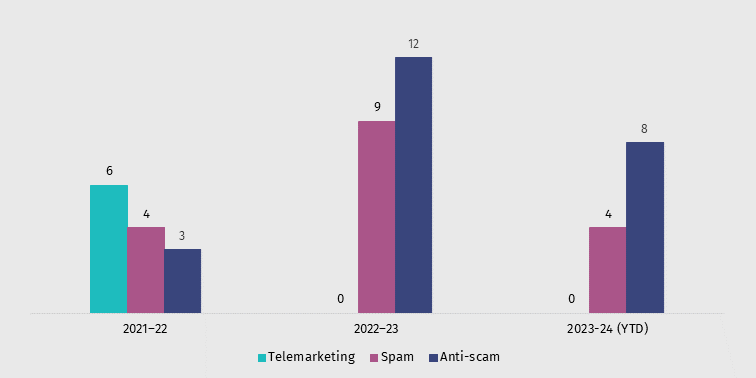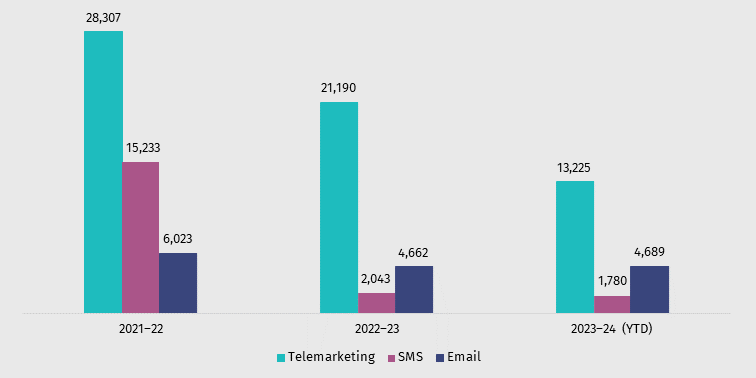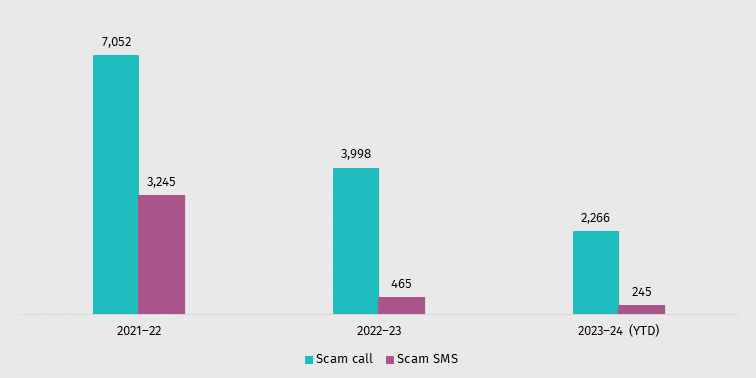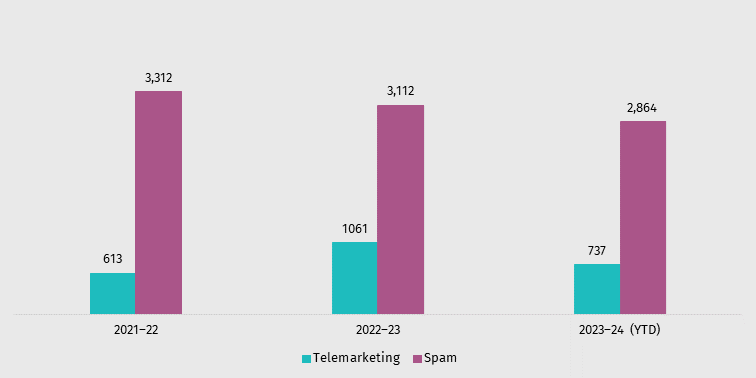Our key actions |
|
 |
Outdoor Supacentre (trading as 4WD Supacentre) paid a $302,000 penalty for sending commercial messages without consent. |
 |
Businesses that did not follow the spam rules paid over $12.7 million in penalties over the last 18 months for sending unlawful spam. |
 |
We expanded the pilot of the SMS Sender ID Registry by adding new alpha tags, which helps prevent business message headers in SMS from being impersonated by scammers. |
 |
We sent 1,173 compliance alerts to businesses so they could address potential spam and telemarketing compliance issues (bringing the total to 3,601 in the year to date). |
 |
We issued consumer alerts about the re-emergence of the ‘Hi mum scam’, government ‘cost of living’ impersonation scams, and Do Not Call Register scams. |
Our 2023–24 priorities
During the 2023–24 financial year, we’ll be focusing on 2 compliance priorities for unsolicited communications and scams:
- Combating SMS scams – We’ll be working to prevent SMS scams from reaching Australians by:
- enforcing existing rules
- collaborating with Australian and global partners
- exploring new ways to stop scammers impersonating legitimate brands or organisations.
- Enforcing e-marketing unsubscribe rules – We’ll be concentrating on businesses that don’t action opt-out requests, particularly those that send messages that may cause significant harm like direct marketing of gambling and alcohol, and ‘buy now, pay later’ products and services.
Combating scams
We continue to take the fight to scammers to disrupt their activities and protect Australians.
Telcos have reported blocking more than 1.9 billion scam calls since December 2020 and more than 533 million scam SMS since July 2022, to the end of this quarter. The ACMA and telcos use industry blocking statistics to identify specific and longer-term trends to help inform disruption activities.
We also:
- Expanded the pilot phase of the Sender ID Registry by adding new alpha tags, to help prevent business message headers in SMS from being impersonated by scammers.
- Supported the work of the National Anti-Scam Centre, which was launched by the ACCC on 1 July 2023 under the government’s Fighting Scams initiative.
- Issued consumer alerts about re-emergence of the ‘Hi mum scam’, government ‘cost of living’ impersonation scams, and Do Not Call Register scams.
- Worked alongside telcos, government agencies, international regulators and well-known brands to disrupt phone scams by providing data and intelligence products.
Find out about protections from phone scams.
Enforcing e-marketing unsubscribe rules
Key actions and outcomes in our focus on unsubscribe rules include:
- Outdoor Supacentre paying a $302,000 infringement notice after it breached the Spam Act by sending commercial electronic messages without consent. We accepted a comprehensive 3-year, court-enforceable undertaking that commits Outdoor Supacentre to appointing an independent consultant to review its compliance with the Spam Act and make improvements.
- We gave 607 compliance warnings with targeted fact sheets to businesses where complaints suggested they had potential issues meeting unsubscribe requirements.
Key compliance issue: ‘Welcome journeys’
We are seeing an increase in businesses that may not comply with Australia’s spam laws because they do not have adequate unsubscribe processes for automated SMS and email ‘welcome journeys’.
A welcome journey is a series of automated messages sent to new customers to welcome them to the business over a few days or weeks. They include advertising and often offer discounts.
Some customers have tried to unsubscribe after receiving the first few welcome journey messages but have continued to receive the complete series of messages. This is because the unsubscribe process does not work until the full, automated welcome journey has been completed. These practices place these businesses in potential breach of their unsubscribe obligations under the Spam Act 2003.
If any business plans to have, or has an automated welcome journey set up for customers, each commercial message must have an unsubscribe function that enables customers to opt-out from receiving the full series of welcome journey messages, and any other commercial electronic message, at any time.
Any person or business sending commercial marketing messages must ensure customers are unsubscribed within 5 business days.
Learn more about unsubscribe laws.
Investigations and enforcement
At the end of this quarter, we have:
- 2 anti-scam investigations in progress
- 3 ongoing spam investigations
- monitored compliance with 20 court-enforceable undertakings in force, including 2 relating to anti-scam rules.
For the 12 months to the end of the quarter, we have taken an average of 3.4 months to complete spam investigations and 4.5 months to complete anti-scam investigations.
View our enforcement actions for breaches of spam and telemarketing laws.
View our enforcement actions for breaches of scam laws.
Finalised investigations

Complaints
We received more than 6,200 complaints from consumers about alleged breaches of telemarketing and spam laws in this third quarter. The most common complaints (excluding scams) were about the retail, building and maintenance, and solar sectors.
Complaints received by financial year

Note: We have also received 54 complaints about commercial instant messages to date in 2023–24.
Complaints received about scam calls and SMS

Compliance alerts
If we receive enough information, we alert businesses about potential compliance issues raised in complaints. One alert can relate to several issues or complaints.
Compliance alerts given to businesses

More information
Find out more about spam and telemarketing rules, including how to make a complaint.
Subscribe to our newsletters to get updates about our actions on telemarketing, spam, and scams.
